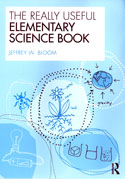Purchase here: • Better World Books • Abe Books UK • Indigo Books
 Amongst the challenges that elementary teachers may often face as they introduce their students to science is the need to maintain a solid understanding of the many scientific concepts and details themselves. This indispensable resource, intended for pre- and in-service elementary school teachers, provides concise and comprehensible explanation of key concepts across science disciplines. Organized around the National Science Education Standards, the book tackles the full range of the elementary curriculum including life sciences, ecological sciences, physical sciences, and earth sciences. Although not a methods text, the clear and accessible definitions offered by veteran teacher educator Jeffrey Bloom will nonetheless help teachers understand science concepts to the degree to which they can develop rich and exciting inquiry approaches to exploring these concepts with children.
Perfect as a companion to any elementary science methods textbook or as a stand alone reference for practitioners, The Really Useful Elementary Science Book is a resource teachers will want to reach for again and again.
Table of Contents
Section 1 – Introduction
Section 2 – Life Processes and Systems
Amongst the challenges that elementary teachers may often face as they introduce their students to science is the need to maintain a solid understanding of the many scientific concepts and details themselves. This indispensable resource, intended for pre- and in-service elementary school teachers, provides concise and comprehensible explanation of key concepts across science disciplines. Organized around the National Science Education Standards, the book tackles the full range of the elementary curriculum including life sciences, ecological sciences, physical sciences, and earth sciences. Although not a methods text, the clear and accessible definitions offered by veteran teacher educator Jeffrey Bloom will nonetheless help teachers understand science concepts to the degree to which they can develop rich and exciting inquiry approaches to exploring these concepts with children.
Perfect as a companion to any elementary science methods textbook or as a stand alone reference for practitioners, The Really Useful Elementary Science Book is a resource teachers will want to reach for again and again.
Table of Contents
Section 1 – Introduction
Section 2 – Life Processes and Systems
Key Idea 2.1 – Characteristics and Basics Needs of Living Things Key Idea 2.2 – Levels of Organization Key Idea 2.3 – Development of Complexity in Animals Key Idea 2.4 – Human Characteristics Key Idea 2.5 – Characteristics of Plants Key Idea 2.6 – The Development of Complexity in Plants Key Idea 2.7 – Issues of Survival for Living Things Key Idea 2.8 – Human Survival and Health Key Idea 2.9 – Growth and Development Key Idea 2.10 – The Theory of Evolution Key Idea 2.11 – Replication and Genetics Key Idea 2.12 – Variety of Life Resources and References
Section 3 – Ecology and the EnvironmentKey Idea 3.1 – The Gaia Hypothesis — The Earth System Key Idea 3.2 – Levels of Organization Key Idea 3.3 – Types of Ecosystems Key Idea 3.4 – Features of the Biosphere and Its Ecosystems Key Idea 3.5 – Dynamics of Ecological Systems or Ecosystems Key Idea 3.6 – Sequences and Cycles — Life, Energy, and Materials Resources and References
Section 4 – Physical SciencesKey Idea 4.1 – Mass and Weight Key Idea 4.2 – Force and Motion Key Idea 4.3 – Energy, Work, Simple Machines, and Other Mechanical Concepts Key Idea 4.4 – Matter: Atoms, Molecules, Solids, Liquids, and Gases Key Idea 4.5 – Waves, Sound, and Light Key Idea 4.6 – Temperature, Heat, and Thermodynamics Key Idea 4.7 – Electrical Phenomena Resources and References
Section 5 – Earth and Space SciencesKey Idea 5.1 – The Structure of the Earth and Earth System Key Idea 5.2 – Earth Features Key Idea 5.3 – Earth Materials and their Properties Key Idea 5.4 – The History of the Earth Key Idea 5.5 – Climate and Weather Key Idea 5.6 – Earth, Moon, and Solar System References and Resources
Reviews
“A good elementary science teacher traverses a wide spectrum of science each year. While the content may be introductory, the breadth of science can be a challenge for anyone in the science community. The temptations for teachers can be to give up in despair and cherry-pick only those science topics with which the teacher is comfortable. Jeffrey W. Bloom has instead used the well founded notion of ‘key ideas’ to bring organization and economy to the breadth of science, and then linked those ideas to school grade levels as per the National Science Education Standards—-all without dumbing down the content. I would expect any K-8 teacher of science to find this aptly-titled book of immediate value for the planning of grade appropriate science lessons without sacrificing rigor.”—Bill Cobern, Professor of Biological Sciences and Science Education, Director of the Mallinson Institute for Science Education, Western Michigan University
“Whether you are trying to answer the query of a child or just refresh your knowledge, this book provides a useful portal to science concepts and terminology. Written in concise language, with helpful diagrams, Jeffrey W. Bloom presents solid overviews of the most commonly encountered school science topics. Such a wealth of information gathered into one easily accessible place will make this an indispensible reference for the serious teacher of elementary science.”—Bernard Ricca, Associate Professor and Director, Graduate Program in Mathematics, Science and Technology Education, Saint John Fisher College
